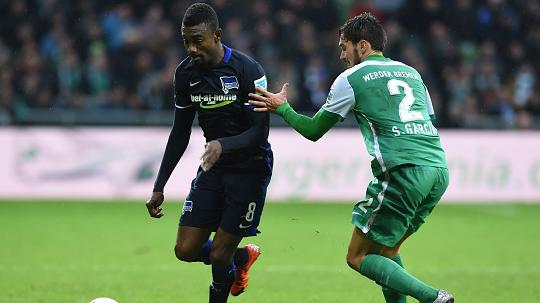Hertha Berlin 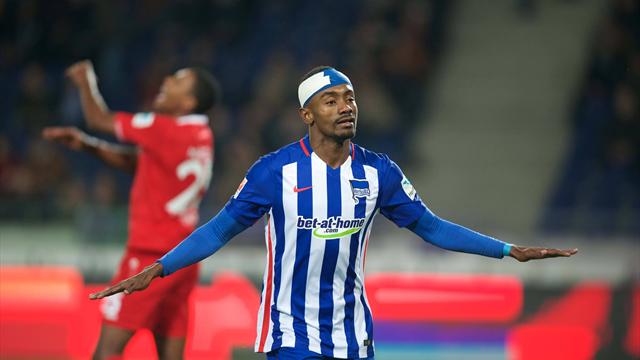 In: Ondrej Duda 4.2m (Legia Warsaw) Out: Tolga Cigerci Key Passing Combos Plattenhardt-Kalou and Ibisevic Weiser-Darida One Weakness: Playmaking from midfield. Hertha were the one of the most dull teams to watch in the Bundesliga if you like either high scoring or high tempo soccer. They were very interesting on paper thanks to a very unique style which resulted in safety but not any excitement on the pitch to most neutrals. However, if everyone tried to play like Leverkusen it would no longer be interesting and Hertha provide a nice change of pace keeping the Bundesliga from becoming too frazzled. Variety is the spice of life, and Hertha are the vanilla needed to make the others of the Bundesliga pop out. With the ball they functioned essentially completed without a playmaking attacker, supplying their forward pair of Kalou and Ibisevic mostly through long balls and from the wings. Kalou received the most passes by far from left back Marvin Plattenhardt while Ibisevic received his most passes from the goalie Rune Jarstein and then Plattenhardt. The one player most looked like a central playmaker would be Genki Haraguchi, but just look at his pass map toward the two forwards to see how that doesn't explain his game:
In: Ondrej Duda 4.2m (Legia Warsaw) Out: Tolga Cigerci Key Passing Combos Plattenhardt-Kalou and Ibisevic Weiser-Darida One Weakness: Playmaking from midfield. Hertha were the one of the most dull teams to watch in the Bundesliga if you like either high scoring or high tempo soccer. They were very interesting on paper thanks to a very unique style which resulted in safety but not any excitement on the pitch to most neutrals. However, if everyone tried to play like Leverkusen it would no longer be interesting and Hertha provide a nice change of pace keeping the Bundesliga from becoming too frazzled. Variety is the spice of life, and Hertha are the vanilla needed to make the others of the Bundesliga pop out. With the ball they functioned essentially completed without a playmaking attacker, supplying their forward pair of Kalou and Ibisevic mostly through long balls and from the wings. Kalou received the most passes by far from left back Marvin Plattenhardt while Ibisevic received his most passes from the goalie Rune Jarstein and then Plattenhardt. The one player most looked like a central playmaker would be Genki Haraguchi, but just look at his pass map toward the two forwards to see how that doesn't explain his game: 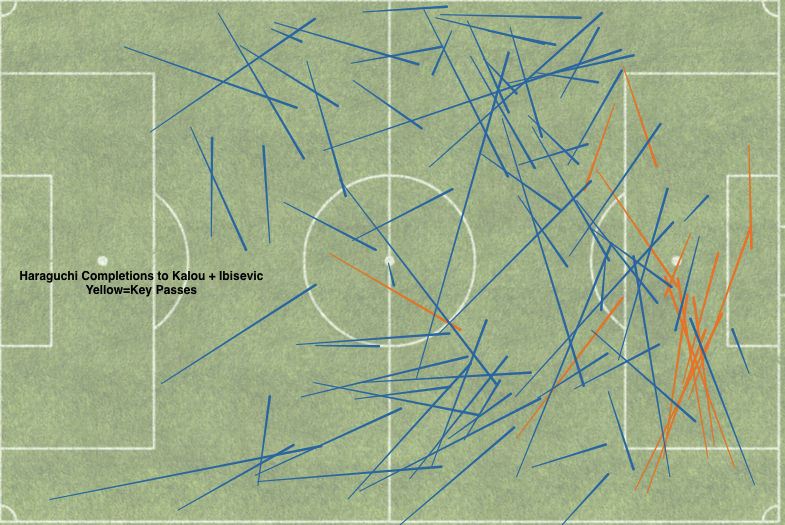 When all three players were over 2000 minutes that's quite a thin looking map for your "playmaker" to two shooting options. The thing is, Haraguchi was the leading provider of key passes to those two with his 15 (just 1 per 90 total for Haraguchi). However they found their two forwards, it worked well enough for both to be in the top 20 players for shortest average shot at 12.6 yards for Ibisevic and 14.8 for Kalou. Hertha weren't a sit and counter team, they had 50% possession it's just where that possession was that leads to their interesting One Big Strength
When all three players were over 2000 minutes that's quite a thin looking map for your "playmaker" to two shooting options. The thing is, Haraguchi was the leading provider of key passes to those two with his 15 (just 1 per 90 total for Haraguchi). However they found their two forwards, it worked well enough for both to be in the top 20 players for shortest average shot at 12.6 yards for Ibisevic and 14.8 for Kalou. Hertha weren't a sit and counter team, they had 50% possession it's just where that possession was that leads to their interesting One Big Strength 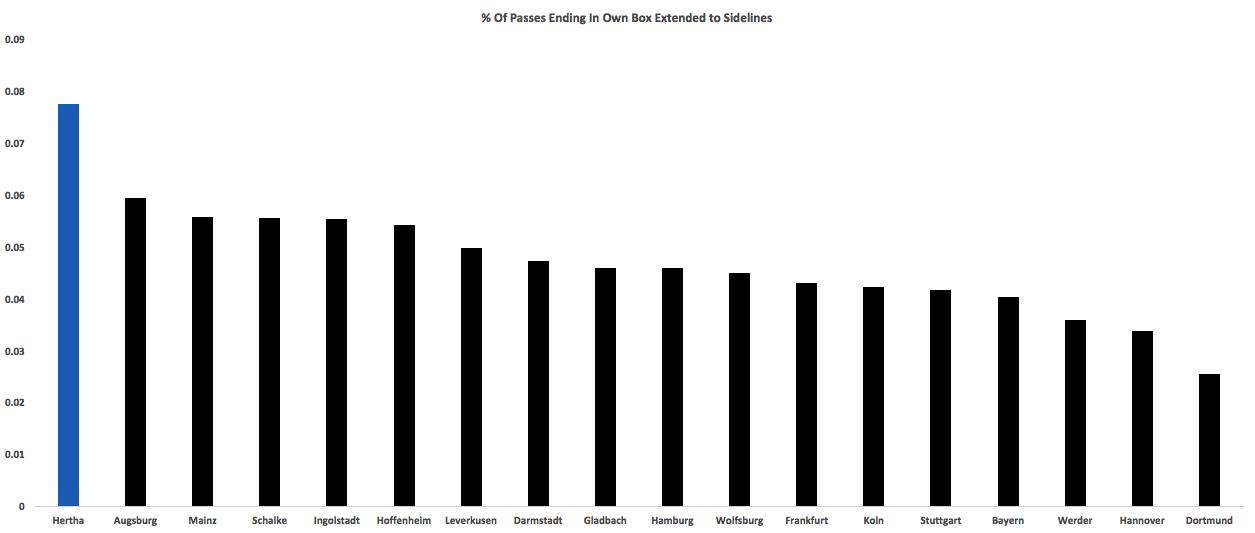 Hertha having the highest ratio of passes to shots is a feature, not a bug, as young coach Pál Dárdai has his center backs play extremely conservatively, with three in the top five at passing the ball backwards.
Hertha having the highest ratio of passes to shots is a feature, not a bug, as young coach Pál Dárdai has his center backs play extremely conservatively, with three in the top five at passing the ball backwards. 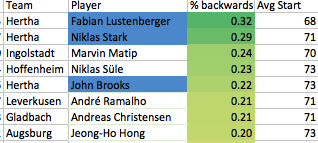 Slowing the game down to Pirlo in MLS speed through defensive possession kept opponents from having huge chunks of the ball. Couple that with a defensive block that forced opponents wide and you get a respectable, low-goals allowed showing. Hertha were challenging for Champions League for much of the season, but a team with the 2nd-fewest dangerous completions and fewest shots will never perform at a Champions League level. Dárdai has his team playing quality defensive possession which is probably enough to avoid a relegation scrap this season. To emphasize these points, a scene from Hertha v Mainz set to music to show all the traits mentioned. Snails pace, no central playmakers, center backs split wide, constant passing back to the keeper, and a dreariness that seemingly seeps into the legs of every player on the pitch. Hertha unsurprisingly had the lowest proportion of completions coming inside the opposition extended box area. How you know the defensive possession worked? Their opponents were last in the same category. So if you really want to see a game where neither team gets the ball close to the opposition goal, this is your team. Best at both ends. Good Season: Add even more possession, and get the shots number into reasonable territory. Sniffing Europa League places would be an accomplishment. Bad Season: The dullness continues but the shots don't go in and they get fewer early leads. Not a team built to come from behind at all, Hertha flail to relegation. Werder Bremen In: Max Kruse 7.5m (Wolfsburg), Florian Kainz 3.5m (Rapid Vienna), Thomas Delaney 2m (Copenhagen), Niklas Moisander 1.8m (Sampdoria), Fallou Diagne 1.5m (Rennes), Lamine Sané Free (Bordeaux), Thanos Petsos Free (Rapid Vienna) Out: Jannik Vestergaard, Anthony Ujah, Papy Djilobodji, Levin Öztunali
Slowing the game down to Pirlo in MLS speed through defensive possession kept opponents from having huge chunks of the ball. Couple that with a defensive block that forced opponents wide and you get a respectable, low-goals allowed showing. Hertha were challenging for Champions League for much of the season, but a team with the 2nd-fewest dangerous completions and fewest shots will never perform at a Champions League level. Dárdai has his team playing quality defensive possession which is probably enough to avoid a relegation scrap this season. To emphasize these points, a scene from Hertha v Mainz set to music to show all the traits mentioned. Snails pace, no central playmakers, center backs split wide, constant passing back to the keeper, and a dreariness that seemingly seeps into the legs of every player on the pitch. Hertha unsurprisingly had the lowest proportion of completions coming inside the opposition extended box area. How you know the defensive possession worked? Their opponents were last in the same category. So if you really want to see a game where neither team gets the ball close to the opposition goal, this is your team. Best at both ends. Good Season: Add even more possession, and get the shots number into reasonable territory. Sniffing Europa League places would be an accomplishment. Bad Season: The dullness continues but the shots don't go in and they get fewer early leads. Not a team built to come from behind at all, Hertha flail to relegation. Werder Bremen In: Max Kruse 7.5m (Wolfsburg), Florian Kainz 3.5m (Rapid Vienna), Thomas Delaney 2m (Copenhagen), Niklas Moisander 1.8m (Sampdoria), Fallou Diagne 1.5m (Rennes), Lamine Sané Free (Bordeaux), Thanos Petsos Free (Rapid Vienna) Out: Jannik Vestergaard, Anthony Ujah, Papy Djilobodji, Levin Öztunali 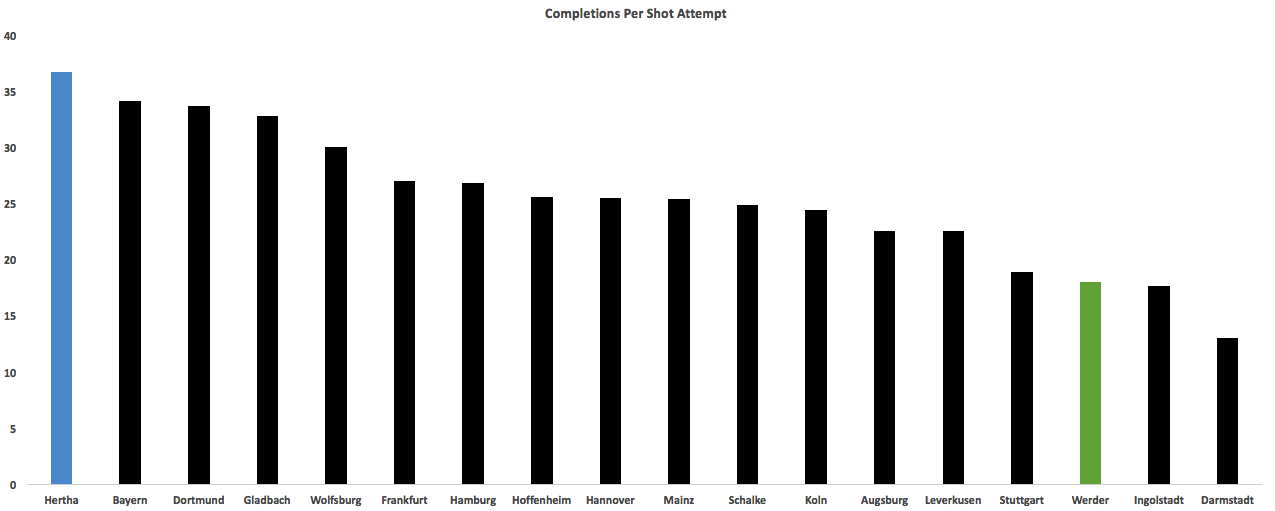 This is where the hare comes in. Werder takes a shot every 18 completions, half the rate of Hertha, and the lowest rate among teams who tried to do anything with the ball other than hoist it forward (with one Groß exception). They escaped relegation late in the year but I think the table belied a performance that deserved much better. Just look at how they fared looking at dangerous territory for/against, one of very few teams to be comfortably in the positives and only behind the Big 3.
This is where the hare comes in. Werder takes a shot every 18 completions, half the rate of Hertha, and the lowest rate among teams who tried to do anything with the ball other than hoist it forward (with one Groß exception). They escaped relegation late in the year but I think the table belied a performance that deserved much better. Just look at how they fared looking at dangerous territory for/against, one of very few teams to be comfortably in the positives and only behind the Big 3.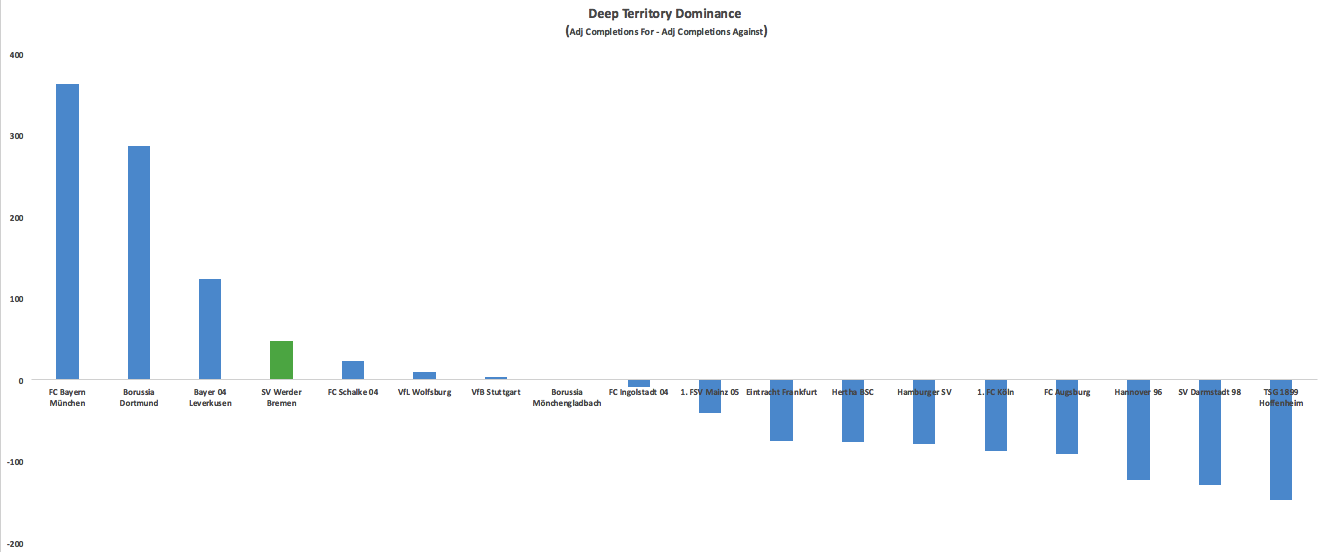 Werder with the ball were basically a swirl of Darmstadt and Leverkusen. They built up chaotically at times but completed a higher rate of dangerous passes than Darmstadt which helped avoid the problem of near-overwhelming pressure on their open-play shooters. They couldn't get as many men into the box as Leverkusen so wound up having a significantly higher % of shots blocked which contributed to the really low shots on target ratio. Putting it all together, their rambunctious attack without established passing connections doesn't really signify a master plan from coach Victor Skripnik but worked well enough to put up 50 goals without crazy conversion rates. It was the defense that conceded 65 goals and had them teetering on edge of relegation and it's the defense that is the big question this season. One Big Weakness? Both starting center backs are gone in Papy Djilobodji and Jannik Vestergaard and while the new guys come with big minutes in France and Italy last year, it is a worry. The reason for the question mark is last years huge goals allowed total looks a lot like awful luck.
Werder with the ball were basically a swirl of Darmstadt and Leverkusen. They built up chaotically at times but completed a higher rate of dangerous passes than Darmstadt which helped avoid the problem of near-overwhelming pressure on their open-play shooters. They couldn't get as many men into the box as Leverkusen so wound up having a significantly higher % of shots blocked which contributed to the really low shots on target ratio. Putting it all together, their rambunctious attack without established passing connections doesn't really signify a master plan from coach Victor Skripnik but worked well enough to put up 50 goals without crazy conversion rates. It was the defense that conceded 65 goals and had them teetering on edge of relegation and it's the defense that is the big question this season. One Big Weakness? Both starting center backs are gone in Papy Djilobodji and Jannik Vestergaard and while the new guys come with big minutes in France and Italy last year, it is a worry. The reason for the question mark is last years huge goals allowed total looks a lot like awful luck. 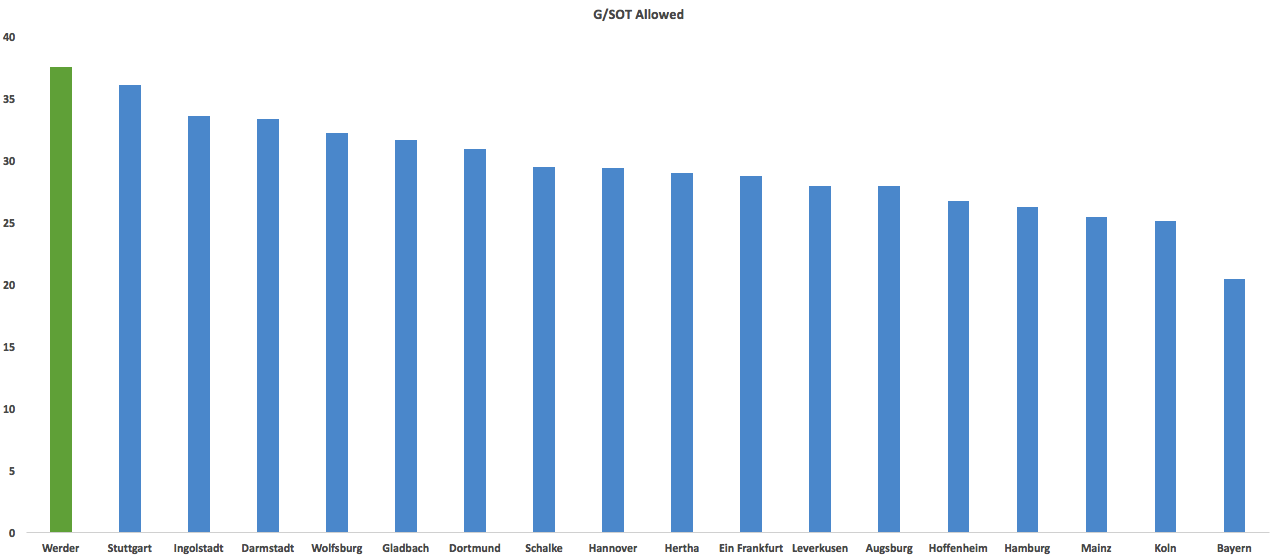 No team allowed more of the shots-on-target to go in than Werder did. And while there is some skill involved in your defensive G/SOT rate, it's mostly luck and there is a lack of convincing narrative as to why Werder's was so high. Stuttgart never blocked shots, had the highest SOT% allowed, and had the worst ratio of defenders to attackers in the league so I can buy they deserved their number. Werder blocked shots at 3rd highest rate in the league, were one of the best at pressuring shooters in a sampling of shots, and had a right around league average SOT% allowed. The simplest solution is Werder were just really unlucky last year and if you ran it back they would have allowed ~50 goals instead of 65. One Big Addition Last year Werder lacked the ability to slow down and control possession around the box before making a move to attempt a shot. You can see this on their passing map, where the redder areas show they complete fewer passes than expected based on start and end position.
No team allowed more of the shots-on-target to go in than Werder did. And while there is some skill involved in your defensive G/SOT rate, it's mostly luck and there is a lack of convincing narrative as to why Werder's was so high. Stuttgart never blocked shots, had the highest SOT% allowed, and had the worst ratio of defenders to attackers in the league so I can buy they deserved their number. Werder blocked shots at 3rd highest rate in the league, were one of the best at pressuring shooters in a sampling of shots, and had a right around league average SOT% allowed. The simplest solution is Werder were just really unlucky last year and if you ran it back they would have allowed ~50 goals instead of 65. One Big Addition Last year Werder lacked the ability to slow down and control possession around the box before making a move to attempt a shot. You can see this on their passing map, where the redder areas show they complete fewer passes than expected based on start and end position.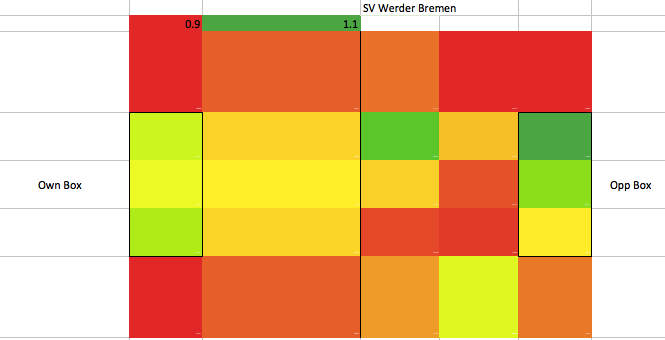 They got one of the best players out there to fix those problems in Max Kruse. He needs to be re-motivated, as he clearly wasn't last year at Wolfsburg, but his time at Gladbach was a massive success. At Gladbach he completed 68% of his 19 attacking area passes per game (start and end in 2 furthest right "blocks" on passing map). Comparing those numbers to Werder's players shows he might be an excellent fit.
They got one of the best players out there to fix those problems in Max Kruse. He needs to be re-motivated, as he clearly wasn't last year at Wolfsburg, but his time at Gladbach was a massive success. At Gladbach he completed 68% of his 19 attacking area passes per game (start and end in 2 furthest right "blocks" on passing map). Comparing those numbers to Werder's players shows he might be an excellent fit. 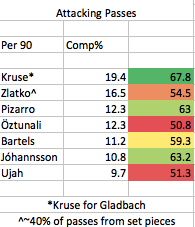 Kruse can give Werder an attacking centerpoint with the ball. Last year they had no one to focus on in the attacking third, and really no one all over the pitch with the only players over 40 passes a game the two center backs. With Kruse slotting in and Johannsson coming back, Werder are immediately a massively more talented team up top. I've loved Johannsson on the national team and thought he made a promising start to his career last season before his serious, long-term hip injury. It's a big question mark if he can come back full speed but if he does, he should help out a lot in attack. With those guys clicking alongside Pizarro up top, there is less pressure on set-piece extraordinaire Zlatko Junuzovic to create. Last year Zlatko was 2nd in the league in key passes, with 54 from set pieces. In a quirk you wouldn't find looking at the goal-scoring list, 4-goal Zlatko actually took more open play shots than 14-goal Pizarro did. Who Else in the midfield? Kruse needs service to set up in the final third so we need to sort out the midfield. For me, Sambou Yatabaré is not under consideration at all based on his abject performance last season. He wasn't playing centrally (mainly on the right) but still had the worst passing rating of any player in his area of the pitch. With no defensive contribution, he's not a guy who should see big minutes. That leaves 3 for 2 spots assuming Junuzovic is in the more attacking central role. Let's run a little statistical experiment, using last years stats to try and stitch together this years primary combo. Let's take a look at the raw numbers
Kruse can give Werder an attacking centerpoint with the ball. Last year they had no one to focus on in the attacking third, and really no one all over the pitch with the only players over 40 passes a game the two center backs. With Kruse slotting in and Johannsson coming back, Werder are immediately a massively more talented team up top. I've loved Johannsson on the national team and thought he made a promising start to his career last season before his serious, long-term hip injury. It's a big question mark if he can come back full speed but if he does, he should help out a lot in attack. With those guys clicking alongside Pizarro up top, there is less pressure on set-piece extraordinaire Zlatko Junuzovic to create. Last year Zlatko was 2nd in the league in key passes, with 54 from set pieces. In a quirk you wouldn't find looking at the goal-scoring list, 4-goal Zlatko actually took more open play shots than 14-goal Pizarro did. Who Else in the midfield? Kruse needs service to set up in the final third so we need to sort out the midfield. For me, Sambou Yatabaré is not under consideration at all based on his abject performance last season. He wasn't playing centrally (mainly on the right) but still had the worst passing rating of any player in his area of the pitch. With no defensive contribution, he's not a guy who should see big minutes. That leaves 3 for 2 spots assuming Junuzovic is in the more attacking central role. Let's run a little statistical experiment, using last years stats to try and stitch together this years primary combo. Let's take a look at the raw numbers  and a look at their forward passing connections (with labels of receivers removed for ease of reading)
and a look at their forward passing connections (with labels of receivers removed for ease of reading) 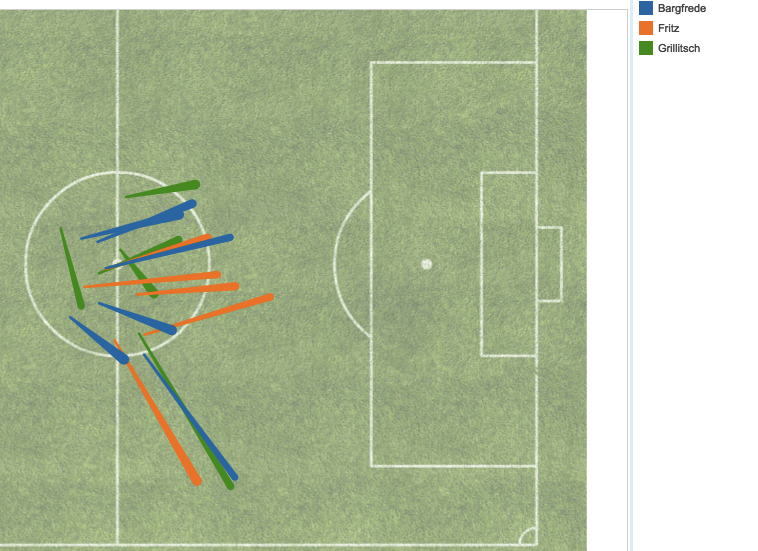 We can learn a lot from this. Bargfrede plays further back, is a tick worse passer and does the most defensive work of everyone. We see Fritz likes to connect further forward with central players and even though Grillitsch passes centrally slightly more, his most common connections are less vertical. With Zlatko and Kruse likely playing centrally ahead of these midfielders you'd like to have Fritz's central passing. Bargfrede doesn't bring much more to the table than Grillitsch and the ceiling is higher for the 20-year old so we stick Grillitsch in alongside Fritz on opening day. I'd like to think Fritz-Kruse is a much more reliable passing connection to bring us into the final third than anything we had last year. Grillitsch is alongside finding Bartels and other wide players with his longer balls while playing a bit deeper for clean-up purposes, add some broth, throw in a potato and baby, we got a stew going. Bargfrede for Fritz looks like the common switch when you are worried about opponents possession in midfield and don't want to worry about the 35-year olds legs as a defensive liability. UPDATE: Werder Bremen played Fritz/Zlatko in midfield and Yatabare in front and got overrun by Sportfreunde to the tune of 22 shots and a loss in the Cup to the third tier team. That possibility didn't cross my mind and should never be used again. If Skripnik keeps that up, I suspect Werder will need a new coach to help them reach their substantial ceiling. And in the tortoise and the hare story, the tortoise finishes above the hare. I'm not predicting that so if you were expecting exact alignment with the fairy tale and my preview, I apologize.
We can learn a lot from this. Bargfrede plays further back, is a tick worse passer and does the most defensive work of everyone. We see Fritz likes to connect further forward with central players and even though Grillitsch passes centrally slightly more, his most common connections are less vertical. With Zlatko and Kruse likely playing centrally ahead of these midfielders you'd like to have Fritz's central passing. Bargfrede doesn't bring much more to the table than Grillitsch and the ceiling is higher for the 20-year old so we stick Grillitsch in alongside Fritz on opening day. I'd like to think Fritz-Kruse is a much more reliable passing connection to bring us into the final third than anything we had last year. Grillitsch is alongside finding Bartels and other wide players with his longer balls while playing a bit deeper for clean-up purposes, add some broth, throw in a potato and baby, we got a stew going. Bargfrede for Fritz looks like the common switch when you are worried about opponents possession in midfield and don't want to worry about the 35-year olds legs as a defensive liability. UPDATE: Werder Bremen played Fritz/Zlatko in midfield and Yatabare in front and got overrun by Sportfreunde to the tune of 22 shots and a loss in the Cup to the third tier team. That possibility didn't cross my mind and should never be used again. If Skripnik keeps that up, I suspect Werder will need a new coach to help them reach their substantial ceiling. And in the tortoise and the hare story, the tortoise finishes above the hare. I'm not predicting that so if you were expecting exact alignment with the fairy tale and my preview, I apologize.
2016
Tortoise and the Hare: Hertha and Werder Bremen
By admin
|
August 22, 2016
